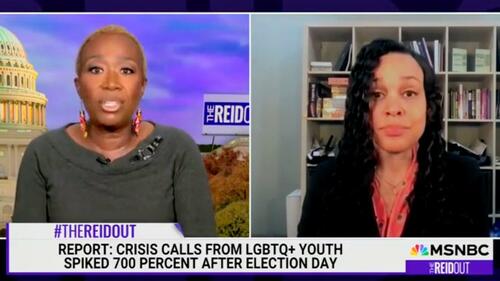With women pledging to break up with their boyfriends and divorce their husbands over the Trump victory, Yale University chief psychiatry resident Dr. Amanda Calhoun is advising that it may also be necessary for your mental health to cut off your family and friends who supported Trump. In that way, you can avoid being “triggered” by opposing political views — much like Yale itself.
As academics, we are dealing with the election on campuses across America. After the election, I had some valuable discussions with students who supported Harris and some who supported Trump. I wish there would be more interaction between the two groups. That is why this story stood out for me. I do not believe that further separation or isolation will help this country or these individuals.
Dr. Calhoun went on MSNBC’s Joy Reid to offer the curious take on good mental health.
Reid has spent the week condemning the majority of voters (particularly minority voters) in the nation as racists and misogynists for the Trump victory.
Reid joined a rising tide of rage, which I discussed in my column this weekend.
Reid asked “how do you interact with people who you know voted for this?"
“If you are an LGBTQ person and you know someone in your family voted essentially against your rights or you’re a woman,” Reid continued:
“do you recommend, just from a psychological standpoint, being around them? We got the holidays coming up.”
Calhoun responded, “So I love that you asked this question because there is a push, I think, just a societal norm that if somebody is your family, that they are entitled to your time.”
“And I think the answer is absolutely not,” she declared.
Dr. Calhoun then contributed more to the madness.
“So, if you are going into a situation where you have family members, where you have close friends who you know have voted in ways that are against you… it’s completely fine to not be around those people and to tell them why…
…You know, to say, ‘I have a problem with the way that you voted because it went against my very livelihood, and I’m not going to be around you this holiday. I need to take some space for me.’
I think you should very much be entitled to do so, and I think it may be essential for your mental health.”
Joy Reed/MSNBC are now advising democrats to avoid their Trump supporting relatives during the holidays.
— Clint Russell (@LibertyLockPod) November 9, 2024
Coincidentally, a top indicator of cult like behavior is to try and isolate your adherents from their family pic.twitter.com/yrCoekVOj7
There is another possibility. You can try to resolve those feelings with people who you previously liked or loved. It may actually help to discuss these issues outside of the echo chamber of your political associations.
Of course, Yale University itself has followed this advice for years by removing faculty with opposing views for the general welfare of the community. Surveys show that 77% of Yale faculty “are registered as Democrats or have conducted political activity that heavily or exclusively supports Democrats; under 3% are Republican.” Furthermore, among 16 surveyed departments, “over 57%, have no registered Republicans at all. Across 14 departments in the Social Sciences and Humanities, the report identified 312 Democrat faculty (88%) and only 4 Republicans (1.1%), a ratio of around 78 to 1.”
Now, that is mental tranquility.
The suggestion that it may be “triggering” to see family and friends is not unique to Yale’s psychiatric staff.
Across the country, women have been cutting their hair and joining the Korean 4B movement—bihon (no marriage), bichulsan (no childbirth), biyeonae (no dating), and bisekseu (no sex). One is quoted as saying, “I fear The Handmaid’s Tale will become our reality.”
It is a curious response since figures like Reid blame white women for the loss. Trump won white women voters by eight points at 53 percent. Harris actually fell slightly in the support of women overall. Conversely, roughly 43 percent of men voted for Harris. Forty percent of women under 30 voted for Trump.
Yet I watched one deranged voter say that she is thinking of buying a “Glock” and shooting the first man who comes near her. If so, she would have an over 4 out of 10 likelihood of shooting a fellow Harris supporter.
None of this is good for our nation’s mental health and suggesting that people retreat further into their silos does not make for particularly healthy advice.
As discussed in my book, The Indispensable Right, we have become a nation of rage addicts. Taking another hit of rage will do little to break that addiction.
* * *
Jonathan Turley is the Shapiro Professor of Public Interest Law at George Washington University. He is the author of “The Indispensable Right: Free Speech in an Age of Rage” (Simon & Schuster, 2024).
